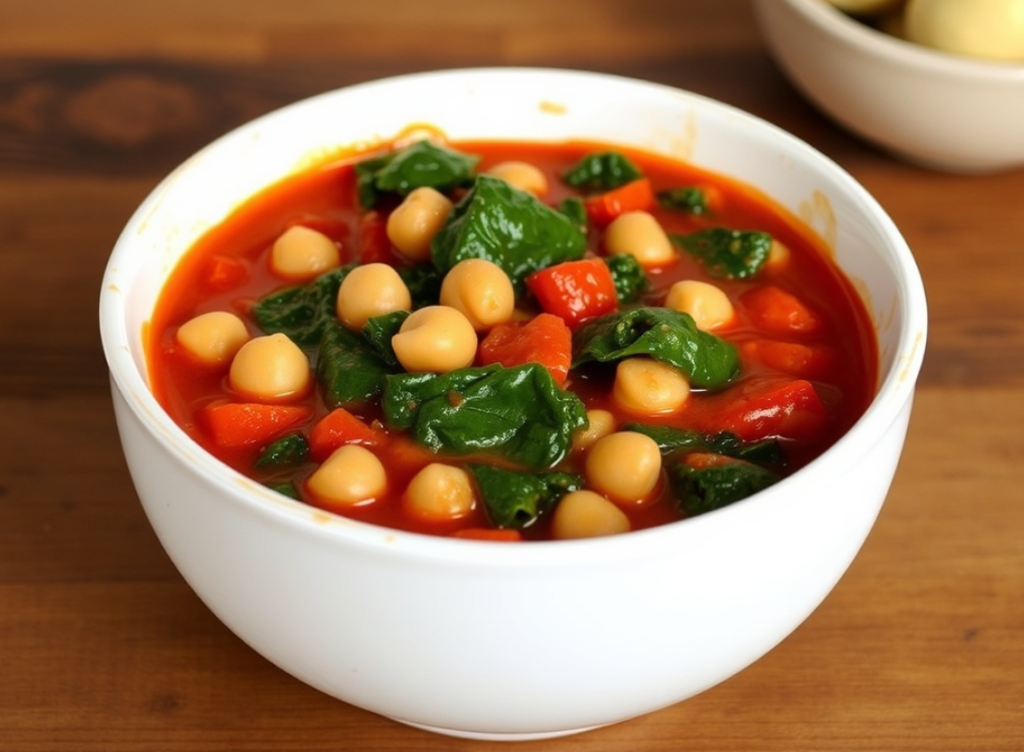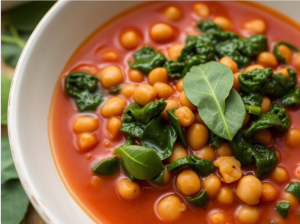
Greek chickpea and spinach stew, or “Revithosoupa,” stands out as a perfect example of Greek’s culinary heritage. This hearty and nutritious dish combines protein-rich chickpeas with fresh spinach and aromatic herbs, creating a comforting meal that is both delicious and wholesome. In this article, we’ll delve into the history, ingredients, preparation, health benefits, and serving suggestions for this delightful stew.
A Brief History of Revithosoupa
Revithosoupa has its roots in the traditional Greek diet, where legumes, particularly chickpeas, have been a staple for centuries. In ancient times, chickpeas were highly valued for their nutritional properties and were often used in various dishes across the Mediterranean. The stew is especially popular in rural areas of Greece, where families would prepare hearty meals using locally sourced ingredients.
Over the years, Revithosoupa has evolved, with regional variations incorporating different herbs and vegetables. Its simplicity and wholesome nature make it a beloved dish, often served during colder months or as a nourishing meal for gatherings.
Ingredients
Main Ingredients
- Chickpeas: The foundation of the stew, providing a rich source of protein and fiber. They can be used dried or canned, depending on convenience.
- Spinach: Fresh or frozen spinach adds a burst of color and essential nutrients, including iron and vitamins A and C.
- Onion: Chopped onions contribute sweetness and depth, forming the aromatic base of the stew.
- Garlic: Minced garlic enhances the flavor profile, adding a fragrant touch.
- Tomatoes: Fresh or canned tomatoes add acidity and richness, balancing the earthiness of the chickpeas.
- Olive Oil: A staple in Greek cooking, it adds flavor, healthy fats, and richness to the stew.
- Vegetable Broth: Serves as the base for the stew, enriching it with flavor and moisture.
Herbs and Spices
- Dill: A key herb in Greek cuisine, dill imparts a fresh, aromatic flavor that brightens the dish.
- Oregano: Adds a warm, earthy note, enhancing the Mediterranean essence.
- Salt and Pepper: Essential for seasoning and balancing flavors.
- Lemon Juice: Brightens the dish and adds a touch of acidity, enhancing the overall taste.
Preparation
Step-by-Step Instructions
- Prepare the Chickpeas: If using dried chickpeas, soak them overnight in water and cook until tender. This usually takes about 1-2 hours. If using canned chickpeas, simply rinse and drain them to remove excess sodium.
- Sauté the Aromatics: In a large pot, heat a generous amount of olive oil over medium heat. Add the chopped onions and sauté until they become translucent, about 5-7 minutes. Stir in the minced garlic and cook for an additional minute, allowing the garlic to release its aroma.
- Add Tomatoes: Incorporate the chopped tomatoes into the pot. If you’re using canned tomatoes, include their juices. Cook for about 5 minutes, allowing the mixture to thicken slightly and the flavors to meld.
- Add Chickpeas and Broth: Stir in the cooked chickpeas and vegetable broth. Bring the mixture to a boil, then reduce the heat and let it simmer for about 15-20 minutes. This allows the chickpeas to absorb the flavors from the broth and spices.
- Add Spinach and Herbs: Add the spinach and fresh dill, stirring until the spinach wilts. If using dried dill, add it earlier in the cooking process to allow the flavors to meld. Continue to simmer for another 5-10 minutes.
- Season and Finish: Season the stew with salt, pepper, and a generous squeeze of lemon juice to enhance the flavors. Give it a final stir and let it simmer for a few more minutes to combine all the elements.
Health Benefits
Greek chickpea and spinach stew is not just a comforting meal; it also offers numerous health benefits:
- Rich in Nutrients: Chickpeas are high in protein, fiber, and essential vitamins and minerals, while spinach is loaded with iron, vitamins A, C, and K, making this stew a nutritional powerhouse.
- Low in Calories: The stew is low in calories yet filling, making it an excellent option for those looking to maintain or lose weight without sacrificing taste.
- Heart-Healthy: The olive oil used in the recipe is rich in monounsaturated fats, which are beneficial for heart health and can help lower cholesterol levels.
- Digestive Health: The fiber content from both chickpeas and spinach supports digestive health, promoting regularity and gut health.
- Anti-Inflammatory Properties: The ingredients in the stew, particularly garlic and olive oil, have anti-inflammatory properties that can contribute to overall health.
Serving Suggestions
Greek chickpea and spinach stew can be enjoyed in a variety of ways, making it a versatile dish:
- With Crusty Bread: Serve with crusty whole-grain bread or pita for dipping. The bread is perfect for soaking up the flavorful broth.
- Over Rice or Quinoa: Spoon the stew over a bed of rice or quinoa for a more substantial meal, adding extra fiber and protein.
- Garnished with Feta: Crumbled feta cheese adds a tangy flavor and creamy texture, enhancing the overall experience.
- As a Side Dish: This stew can also work well as a side dish alongside grilled meats, roasted vegetables, or a fresh Greek salad.
- Meal Prep: This stew is great for meal prep, as it stores well in the fridge for several days and can be frozen for longer storage.

Variations and Adaptations
While the classic recipe is delicious as is, you can also customize it to suit your taste:
- Add Other Vegetables: Carrots, bell peppers, or zucchini can be added for extra flavor and nutrition.
- Spicy Version: For those who enjoy heat, adding red pepper flakes or diced jalapeños can give the stew a spicy kick.
- Creamy Version: A swirl of coconut milk or a dollop of yogurt can create a creamy texture, making the stew even more comforting.
Conclusion
Greek chickpea and spinach stew is a nourishing and flavorful dish that embodies the essence of Mediterranean cooking. Its wholesome ingredients and vibrant flavors make it an excellent choice for a cozy dinner or a meal prep option. Whether enjoyed on its own or paired with other dishes, this stew is sure to become a favorite in your culinary repertoire. Experience the warmth and goodness of Greece in every hearty spoonful, and enjoy the myriad health benefits this delightful stew has to offer.



